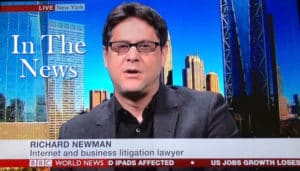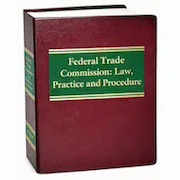Ad Law Insights - Legal and Regulatory Updates
FTC + state attorneys general digital marketing compliance, investigation + enforcement advocacy by FTC lawyer to Internet business community
This website is brought to you by Hinch Newman LLP and FTCDefenseLawyer.com.



Marketers that utilize Made in USA claims on their websites, Amazon listings and other marketing materials should take care not to overstate the extent to which certain products are made in the United States.
In most instances, unqualified U.S.-origin claims in marketing materials – including claims products are “Made” or “Built” in the USA – likely suggest to consumers that the advertised products are “all or virtually all” made in the United States.
Depending upon the content, the Federal Trade Commission may analyze a number of different factors to determine whether a product is “all or virtually all” made in the United States, including the proportion of total manufacturing costs attributable to U.S. parts and processing, how far removed any foreign content is from the finished product, and the importance of the foreign content or processing to the product’s overall function.
The “all or virtually all” standard is codified in the Made in USA Labeling Rule, 16 C.F.R. § 323 (the “MUSA Labeling Rule”). Effective August 13, 2021, it is a violation of the MUSA Labeling Rule to label any covered product “Made in the United States,” as the MUSA Labeling Rule defines that term, unless the final assembly or processing of the product occurs in the United States, all significant processing that goes into the product occurs in the United States, and all or virtually all ingredients or components of the product are made and sourced in the United States. Pursuant to 15 U.S.C. § 45(m)(1)(A), the Commission may seek civil penalties of up to $53,088 per MUSA Labeling Rule violation.
On February 10, 2026, the New York City Department of Consumer and Worker Protection announced that it filed filing a lawsuit against a national publicly-traded self-storage company that operates approximately 60 locations across New York City.
According to DCWP, after reviewing more than 100 complaints the agency’s investigation found that the company “consistently fails to provide the quality of services it advertises and uses predatory practices that exploit consumers and violate NYC’s Consumer Protection Law.” To address the company’s alleged illegal bait-and-switch scheme, DCWP is seeking to hold the company accountable for its alleged misconduct in New York by pursuing restitution for aggrieved consumers and civil penalties for thousands of violations of City law.
This is the first lawsuit DCWP is bringing against a self-storage company.
“This lawsuit aims to shut down [the company’s] deceptive bait-and-switch scheme, recover full restitution for consumers, and send a clear message to the self-storage industry that exploiting New Yorkers comes with serious consequences,” said Commissioner and DCWP attorney Sam Levine. “This Fee Free February and every month, false advertisements, hidden late fees, other and predatory practices are on our radar. The era of exploiting New Yorkers is over.”
“For too long, self-storage companies like Extra Space have used deceptive tactics to lure New Yorkers in with low introductory rates, only to jack up prices and hit them with hidden fees. This kind of behavior drains consumers’ wallets and undermines affordability in our city,”
As previously covered here and here, the Federal Trade Commission has recently warned businesses to comply with the FTC Consumer Review Rule.
On December 22, 2025, the FTC announced that it sent warning letters to alert a number of companies of potential violations of the Rule on the Use of Consumer Reviews and Testimonials (the “Consumer Review Rule”). The letters warn of potential violations of the agency’s Rule, which prohibits certain deceptive or unfair conduct related to the use of product reviews in advertising and marketing.
These letters confirm, for example, that companies violating the Consumer Reviews Rule may be subject to FTC enforcement actions, civil penalties of up to $53,088 per violation, consumer redress and other remedial measures. Consult with a FTC CID lawyer for how the FTC Consumer Review Rule may impact you or your business.
The Consumer Reviews Rule prohibits reviews and testimonials that misrepresent whether a reviewer’s experience was positive or negative, or whether the reviewer used the product or service at all. It also prohibits businesses from conditioning compensation or other incentives on reviewers expressing a particular sentiment, either positive or negative, or from failing to disclose when reviews are written by company insiders or their immediate relatives. The Rule contains additional provisions relating to company-controlled review websites, suppressing certain reviews, and misusing indicators of social media influence like the number of followers or views.
To focus of this article by a leading FTC Consumer Review Rule lawyer is on the FTC Consumer Review Rule prohibition on “insider consumer reviews and consumer testimonials” (16 CFR 465.5).
The FTC’s Rule on the Use of Consumer Reviews and Testimonials went into effect on October 21, 2024 and addresses deceptive and unfair conduct involving consumer reviews and testimonials. You can also review the FTC’s other guidance on reviews and testimonials, including FAQs relating to the agency’s Endorsement Guides.
Here are 10 things that marketers must be aware of concerning the Rule in order to avoid liability exposure, including the initiation of regulatory investigations. Consult with an FTC review and testimonial rule lawyer if you or your company have received an access letter, a civil investigative demand (CID) or if you are interested in discussing the implementation of preventative compliance measures.
- The Rule authorizes courts to impose civil penalties for knowing violations and is important because fake, false or otherwise deceptive reviews and testimonials have, according to the agency, polluted the marketplace. There is no private right of action under the Rule.
- There is a difference between a consumer review and a testimonial. A consumer review is a consumer’s evaluation, or a purported consumer’s evaluation, of a product, service, or business that is submitted to and published on a website or platform dedicated in whole or in part to receiving and displaying such evaluations. So, consumer reviews could appear, for example, on a site dedicated to consumer reviews or on product pages of retailer websites. A testimonial, one type of endorsement, is an advertising message that consumers are likely to believe reflects the opinions,
On January 27, 2026, the Federal Trade Commission announced that Defendants behind a wide-ranging operation, including its co-CEOs, are permanently banned from marketing and selling business opportunities and credit repair programs as part of an FTC settlement to resolve allegations that their purported scheme cost consumers nearly $50 million. As part of the settlement, the company’s CEOs also will be required to liquidate millions of dollars’ worth of assets, including a multimillion-dollar house in order to provide consumer redress.
“On day one, the Trump-Vance FTC reprioritized combatting fraud that harms American markets. Today’s successful resolution demonstrates that the Commission is focused on protecting our markets from dishonest actors,” said Christopher Mufarrige, Director of the FTC’s Bureau of Consumer Protection.
The FTC sued the company in February 2025, alleging that consumers were deceived by false promises of significant income. The company allegedly offered numerous business opportunities, which failed to deliver promised results while costing consumers significant financial losses. The amended complaint also alleges that consumers had trouble reaching customer support.
Named as defendants in the lawsuit were CEOs, the Operations Manager, the company and its related entities, and a relief defendant. The FTC previously approved, and the court entered, a stipulated order settling its charges against one of the foregoing individuals in August 2025.
That order bans him from marketing or selling business opportunities, engaging in credit repair activities, and making misleading earning claims or assisting others in doing the same.
Topics
Archives
About This Blog and Hinch Newman’s Advertising + Marketing Practice
Hinch Newman LLP’s advertising and marketing practice includes two decades successfully resolving some of the highest-profile Federal Trade Commission (FTC) and state attorneys general digital advertising and telemarketing investigations and enforcement actions. As FTC attorneys, the firm possesses superior compliance knowledge and deep legal advocacy experience in the areas of advertising, marketing, lead generation, promotions, e-commerce, privacy and intellectual property law. It has also been selected to author the Consumer Protection Section of the prestigious American Lawyer Media International Federal Trade Commission: Law, Practice and Procedure Treatise, a comprehensive resource for developments of concern to advertisers, marketers and legal professionals that practice before the Commission. Through these advertising and marketing law updates, Hinch Newman LLP provides commentary, news and analysis on issues and trends concerning developments of interest to digital marketers, including FTC and state attorneys general advertising compliance, civil investigative demands (CIDs), and administrative/ judicial process.
